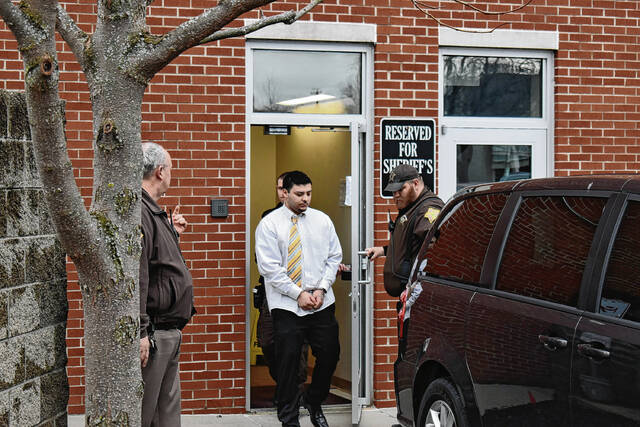Throughout the five-day trial for a Greenwood man charged with attempted murder, both prosecutors and defense attorneys acknowledged the complicated and confusing nature of the case.
In the end, though, the jury heard enough to find Darius Birk guilty on all four charges against him.
Jurors on Monday found Birk guilty of attempted murder, aggravated battery, pointing a firearm at another and carrying a handgun without a license, closing out the week-long trial in Johnson County Superior Court 2.
The most serious of the charges, attempted murder, is a Level 1 felony, which carries a sentence of between 20 and 40 years in prison. His sentencing is scheduled for April 22.
The jury deliberated for about three hours before returning the verdict. After Judge Peter Nugent read the verdict, he acknowledged the difficulty of the case, and thanked the jurors for their diligence and care in deliberating it.
Birk and the victim were riding together in a van on Park Drive in Greenwood on March 13, 2021, when the shooting occurred, according to the probable cause affidavit. The victim, who was driving the van, was shot once in the face, resulting in extensive facial damage that she is still recovering from today.
After deciding not to call Birk to testify, the defense rested its case first thing Monday morning. Both sides then delivered closing arguments before the jury deliberated.
Deputy prosecutor Brianna Acker reminded the jury their focus should be on evidence presented to them and admitted by the court. She used her time to take the overwhelming amount of evidence to connect it all together.
“Each witness is a different puzzle piece,” she said. “We’re going to pull those together today.”
Acker showed photographs, maps and video from near the scene of the shooting to illustrate her points. She focused on the sequence of what happened after the shooting. Evidence shows Birk was driving around with the victim, trying to figure out what to do, before he decided to go to the hospital. Cell phone data shows he didn’t take a direct route to Community Hospital South.
“He didn’t drive to to the hospital. He was driving around a neighborhood, trying to figure out what to do with her,” she said.
Acker also addressed questions by the defense about why the victim’s phone and others’ phones were not searched.
“That’s not what you need. You need the defendant’s phone. Everything you need is going to be on that phone,” she said.
Finishing her arguments, Acker said the case ultimately comes down to the attempted murder charge, including the question of Birk’s intent.
Everything Birk did before the shooting proves he intended to shoot the victim, she said.
The defense arduously disagreed.
Defense attorney Carrie Miles started by addressing the jury and asserting, “It’s not your fault.”
She told them they are not to blame about the confusing and overwhelming nature of the case made by the prosecution, nor is it their fault the evidence in the case inspired so many additional questions from them.
“It’s not your fault you had to ask so many questions that go unanswered, and it’s not your fault the state presented a case that’s so confusing,” Miles said.
She argued that instead of pushing for the charge of attempted murder, the prosecution could have chosen a variety of different charges that would be easier for the jury to find Birk guilty of beyond a reasonable doubt. But the state chose not to do that, she said.
Going through some of the unanswered questions, Miles touched on issues the defense had throughout the trial: What happened with the victim’s phone? Were the documents the victim said Birk tried to rip up in her purse? Why didn’t the doctors who testified have their notes with them in court to better establish the timeline of the victim’s care?
“Ladies and gentlemen, I don’t know how they can expect you to make a decision when this investigation is still not complete,” she said. “It is dangerous to ask you to make a decision with incomplete evidence.”
Fellow defense attorney Andrew Baldwin then took over the closing argument. He described an incident from his early career, in which a woman came to him in tears, desperate for his help after falsely testifying against someone else for a crime they didn’t commit.
Baldwin couldn’t do anything in that case. He didn’t want the jury to make a similar mistake, when they’re not completely sure of Birk’s guilt.
“This is serious business. People’s lives are affected by what you do,” he said.
As the verdict was read, Birk kept his eyes pointed down. Family and supporters in the gallery could be heard crying.





